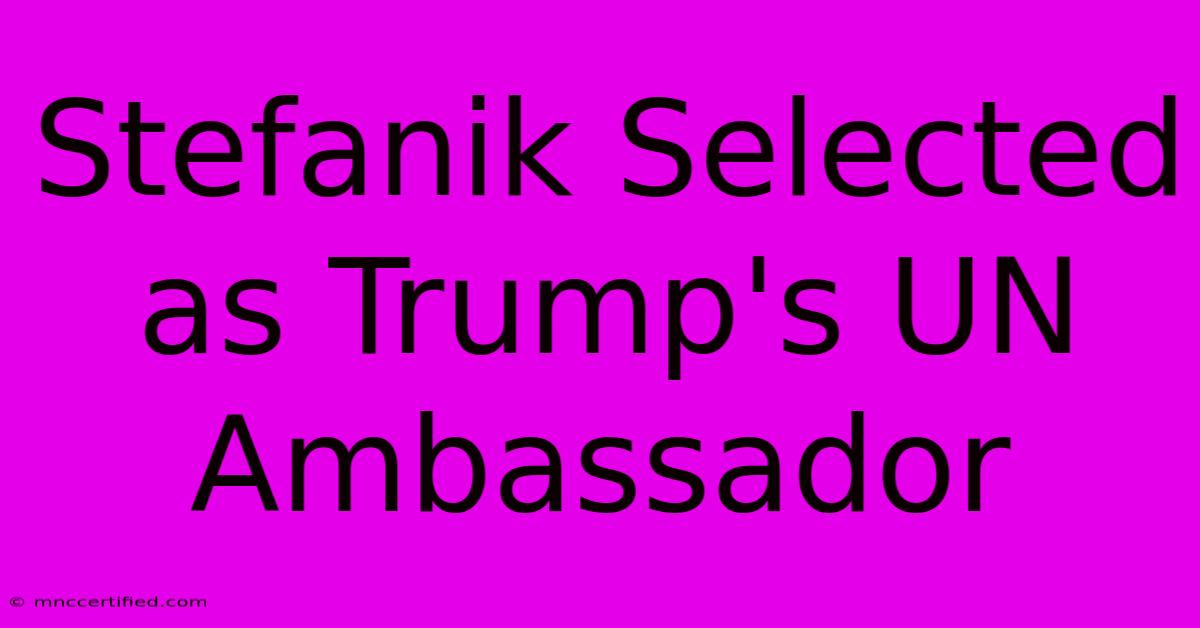Stefanik Selected As Trump's UN Ambassador

Table of Contents
Stefanik Selected as Trump's UN Ambassador: A Controversial Choice
The appointment of Representative Elise Stefanik as the United States Ambassador to the United Nations has sparked significant debate, dividing opinions across the political spectrum. This article will delve into the reasons behind this controversial nomination, analyzing Stefanik's background, her political stances, and the implications of her potential confirmation.
Who is Elise Stefanik?
Elise Stefanik, a Republican representative from New York, first entered Congress in 2015. At 32 years old, she was the youngest woman elected to the House of Representatives and quickly rose through the ranks. Stefanik became known for her sharp political acumen, strong public speaking skills, and her ability to articulate conservative talking points effectively. She served on the House Intelligence Committee and emerged as a prominent voice defending former President Donald Trump during the impeachment inquiry.
Trump's Pick: A Shift in Strategy?
The choice of Stefanik as UN ambassador has been interpreted as a strategic move by former President Trump. Her appointment comes after a string of high-profile controversies surrounding his previous choices for the position. It is believed that Trump sought a more experienced and politically savvy figure who could navigate the complex dynamics of the UN, potentially strengthening his political legacy on the world stage.
Concerns and Controversy
However, Stefanik's nomination has faced significant backlash, with many criticizing her lack of foreign policy experience and questioning her suitability for the role. Critics point to her close ties to Trump and her staunch support for his policies, arguing that she lacks the diplomatic skills and international understanding required for the position. Concerns have also been raised regarding her controversial statements and actions, particularly her role in promoting false narratives and spreading misinformation related to the 2020 election.
The Future of the Nomination
Despite the controversies, Stefanik's nomination has been formally submitted to the Senate for confirmation. It remains to be seen whether she will garner enough support to overcome the political hurdles and secure the position. The Senate confirmation process will likely be a heated debate, with Democrats expressing concerns about her qualifications and Republicans supporting her appointment.
Impact on US Foreign Policy
The outcome of Stefanik's nomination will undoubtedly have implications for US foreign policy. Her potential appointment could signal a shift in the administration's approach to multilateralism and global affairs. Critics fear that her appointment could further damage America's reputation on the world stage, while supporters believe she can effectively represent the US interests while promoting Trump's agenda.
Conclusion
The selection of Elise Stefanik as Trump's UN ambassador remains a highly contested issue. Her nomination has sparked a debate about her qualifications, her political affiliations, and the potential impact on US foreign policy. The confirmation process will likely be a key battleground for both Democrats and Republicans, with the outcome potentially shaping the direction of US foreign policy in the years to come.

Thank you for visiting our website wich cover about Stefanik Selected As Trump's UN Ambassador. We hope the information provided has been useful to you. Feel free to contact us if you have any questions or need further assistance. See you next time and dont miss to bookmark.
Featured Posts
-
Elise Stefanik Background Of Un Ambassador Pick
Nov 12, 2024
-
Narinder Kaur On Vile Kate Comment On Gmb
Nov 12, 2024
-
Blox Fruit Trading Value Win Or Lose
Nov 12, 2024
-
Mtv Emas 2024 Worst Dressed Celebrities Revealed
Nov 12, 2024
-
Manchester United Van Nistelrooys Exit Amorims Arrival
Nov 12, 2024